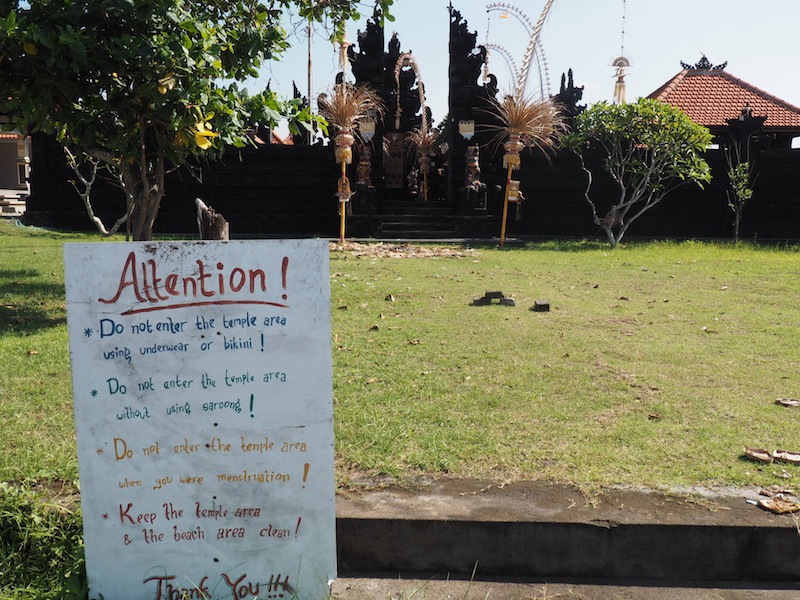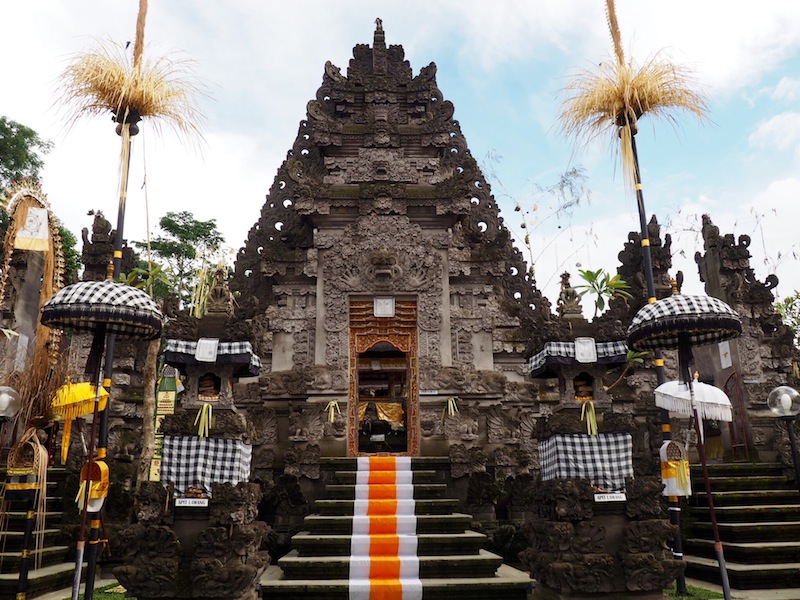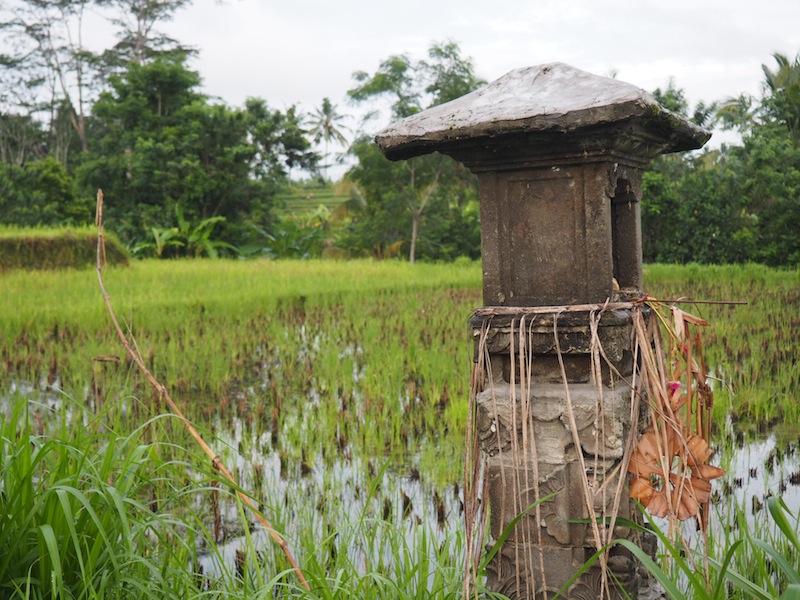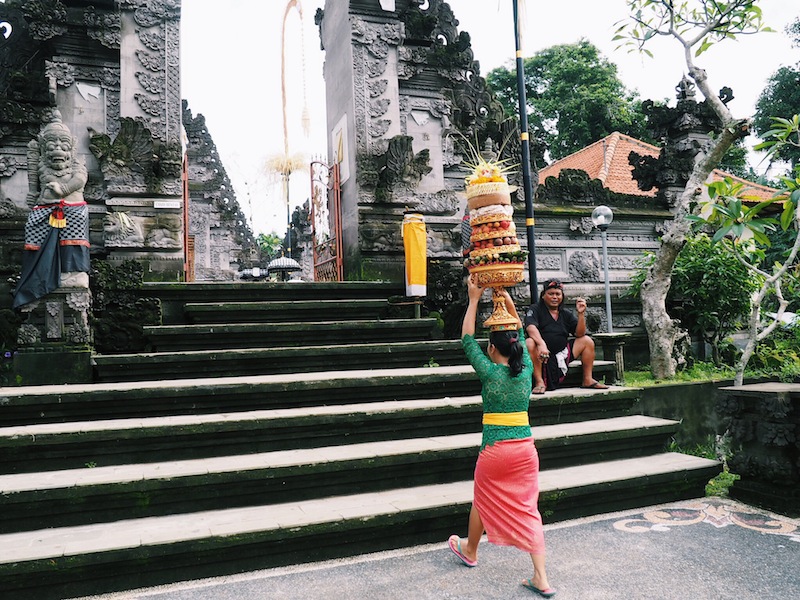On my recent trip to Bali I was eager to learn more about the Balinese Hindus who leave such colourful and incense-filled offerings all around the island. I chose to stay in Canggu and Ubud, which are slightly less touristy areas than where I stayed on my previous visit, and was set up with a fantastic local guide at Alila Ubud who helped answer all my child-like ‘but why’ questions. From the nature of rice fields, to temple rules and silent religious days, below are 3 Balinese customs I think give an interesting insight into the culture of Bali.

No Menstruating In The Temples
On my first day wandering about Canggu I came across an unexpected sign.
“Attention: Do not enter this temple area when you are menstruating.”

I’d been to Bali before and visited some temples but never saw any signs like this. I wondered if the notion was unique to this one particular temple but sure enough when visiting a temple near my hotel in Ubud a few days later I was asked a personal question by a female member of the temple committee. She explained it was considered disrespectful to enter a temple whilst menstruating and after I informed her I was not she beckoned me in.

Neighbourly Nature Of Rice Fields
The famous rice fields of Bali are just as beautiful and serene as I was expecting but with so much of the land split into these little plots I couldn’t help but ask my guide one day who actually owns them. He explained that the land is handed down through generations, each plot being split between the male family members, and that in each village the large fields we see may be owned by several different families.
Water is obviously crucial to the success of growing rice so each community has a system whereby the water flow is directed from the higher land to each field as and when needed.

However, my guide also went on to explain that if a landowner with ground higher than yours decides to build, say a hotel or villa, on his land you could be cut off from the water flow and lose your crops and livelihood entirely. The success of the rice farmers therefore depends heavily on the relationship with their neighbour.

Balinese New Year – A Day Of Silence
On 9th March 2016 the Balinese will celebrate Nyepi Day for the start of the new year. The Balinese jointly follow 2 calendars and Nyepi is the start of the Saka calendar, which is 78 years behind ours! Nyepi follows after a new moon and is celebrated in a very special way – everything is switched off. The Four Nyepi Prohibitions state that Balinese Hindus must practise no pleasure (amati lelangon), no traffic (amati lelungan), no fire (amati geni) and no work (amati karya). Essentially the whole island shuts down – the TV networks switch off, the roads are devoid of traffic, the people are to remain at home and even the airport is closed for 24 hours.

Visitors are expected to respect the local customs too and are not permitted to leave their hotels. The only people found on the streets are the traditional community watch patrols who enforce the rules of Nyepi. Most hotels will explain to their guests in advance about the tradition and put on quiet activities inside the resort to keep guests busy. Many tourists do leave Bali at this time though because of the restrictions. However, the days before and after Nyepi are filled with colourful parades and celebrations (including the intriguing Ogoh-Ogoh exorcism ceremony and parade the day before Nyepi), which make it a very special time to be a guest here.

I think it’s incredibly admirable in this age that a whole island can shut down for a day to uphold a religious tradition even if it’s not so good for tourism! I don’t think I’ve been anywhere that completely closes for 24 hours. Have you?
Will you be in Bali for Nyepi Day? Did you know about these Balinese customs?


Wow! It seems that all your hear about Bali these days are how it’s becoming a party paradise, especially with Australians. It’s great to read about the REAL Bali – the interesting culture, and beautiful scenery.
Nyepi Day actually sounds incredibly beautiful! What a great reminder to stop everything, and just be with the people you love.
And don’t even get me started on the rice fields (stunning!)
How interesting that you can’t enter temples when menstruating – will have to remember that if a friend (or hopefully myself) ever visits Bali.
Thanks for sharing!
I completely agree – it sounds like a wonderful way to celebrate with your family – no gadgets for distraction. And like you I’d only read about the party or luxury side of Bali so wanted to share some of these insights into the culture. So glad you enjoyed it.
Love this post, it’s very interesting! I hope to get to Bali sometime soon 🙂
http://travelmatters.co/
Thank you! It’s a wonderful place to visit.
Wow, we only spent a week in Bali but had no idea about any of these! Especially no menstruating in the temples! We visited two temples and didn’t see any sign for that! Haha! Thanks for sharing!
I first visited Bali many years ago when I was a teenager. My fear was that the real Bali I experienced then has all but disappeared under the ugly Aussie invasion. This post gives me hope that some of what makes Bali such a beautiful and inspirational place is still there. Thank you.
It definitely is!
I just back from Bali 1 week ago, i spent a week in there also. I was impressed by Temple’s rules in Ubud also. However, just some temples in there have rule about menstruating such as Goa Lawah Temple, Pura Tirtha Empul, Pura Besakih, Pura Batukaru….
One thing I am really imspressed by temple in Bali that is about only workshipper can go inside the temple to ceremony. Tourists aren’t allowed to come inside. Maybe, tourists are not happy about this but i think it’s okay to me. It’s the way to respect Balinese.
Thanks for your post, it makes me love Bali more.
Thank you for your insight too!
I had no idea about any of this… I hope to visit someday soon! 🙂